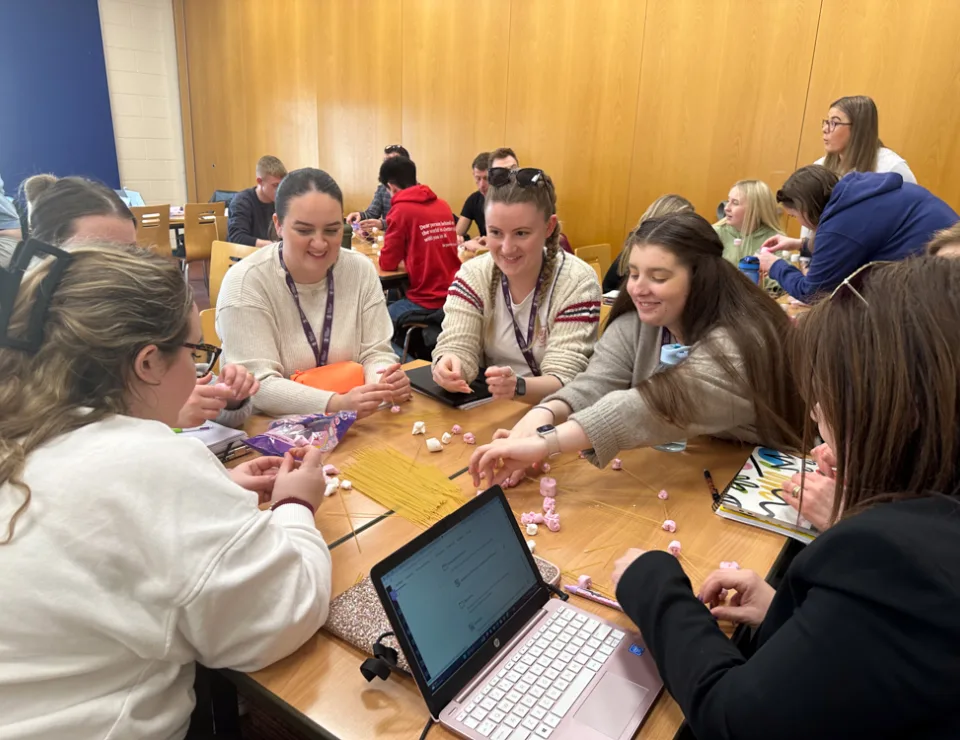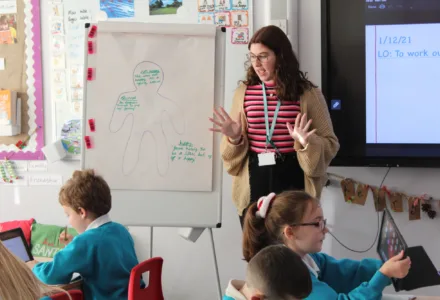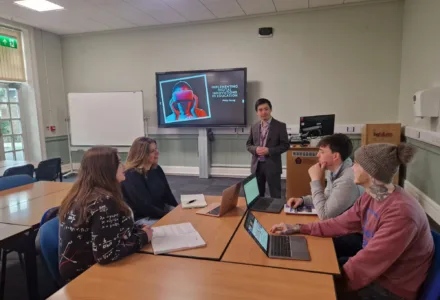Why study this course
Continue working or volunteering while pursuing your degree, providing you with valuable practical experience alongside your academic studies
National Student Survey in 2022 revealed an impressive satisfaction rate of 96.85% among students in professional studies programs, highlighting the quality and effectiveness
Opportunity to study with the support of a research-active team, ensuring you receive the latest insights and developments in this field
Clear career progression opportunities in the education sector, including TA roles, and the option to pursue top-up degree programs that enhance career prospects
Course summary
Are you passionate about making a positive impact on the lives of children and young people? Our innovative Foundation Degree programme in Child Education is tailored to individuals working in primary, secondary, and further education (FE) institutions, who are keen on advancing their careers while maintaining their current roles. This programme offers a unique blend of practical experience and on-campus learning, designed to accommodate your work or volunteer commitments.
Key facts
|
Award |
FdA |
|---|---|
|
UCAS code |
X902 |
|
Duration |
2 years |
|
Mode of study |
Full-time |
|
Start date |
September 2025 |
|
Award |
Bishop Grosseteste University |
|
Institution code |
B38 |
Apply for this course
When you're ready to apply, the route you take will depend on your personal circumstances and preferred method of study. Click the relevant button below to start your application journey.
About this course
With just one weekly on-campus session, you can seamlessly continue your career journey while enhancing your skills and knowledge over a two-year period. It's important to note that this Foundation degree serves as the first two years of a full-time degree programme, providing you with a strong educational foundation.
During the first year, you will embark on a transformative journey into higher education, gaining a deep understanding of learning principles. You will also delve into the intricate relationship between practical experience and effectively meeting the diverse needs of children. This exploration will help you better define your role within the education sector, supporting your professional growth and development.
In the second year, we will guide you through the critical concepts of inclusion, equality, and diversity, equipping you with the essential tools to foster an inclusive learning environment. You will also study modules on learning and assessment, providing you with a comprehensive skillset to excel in your career. Moreover, you will have the unique opportunity to collaborate with peers from various related courses, including those involved in early childhood and youth services. This collaboration will broaden your perspectives and increase your employability, enriching your understanding of working with children and young people.
Many of our students in this programme are employed as Teaching Assistants, actively contributing to educational settings alongside qualified teachers. They play a pivotal role in facilitating formal learning opportunities for children and often take on responsibilities such as leading entire classes or providing targeted support to children with specific needs. Our Foundation Degree is frequently viewed as a stepping stone towards a teaching career, enabling you to progress within your role as a TA and explore opportunities for senior positions in the sector. Furthermore, this programme offers several top-up degree options, empowering you to pursue your long-term goals in the field of child education.
Keep up to date on all our latest news, activities and discussions by following us on social media.
What you will study
Students on this course currently study some or all of the following modules:
This module provides an induction to higher education set within the context of your own learning and supports the development of academic literacies. The underpinning foundations for professional learning are the focus of ‘Tools for Learning’ including ethical principles and reflection. The module also introduces well-established traditional and contemporary learning theories in relation to higher education. The syllabus will include an induction to the range of learning resources available on campus, through the library and CELT to facilitate development of higher education academic literacy skills. You will practice and develop study skills, and evaluate personal learning, reflection, ethics and development. You will study aspects of well-established learning theory associated with development. You will have an opportunity to evaluate and reflect on your personal learning.
This module provides an induction to higher education set within the context of your own learning and supports the development of academic literacies. The underpinning foundations for professional learning are the focus of ‘Tools for Learning’ including ethical principles and reflection. The module also introduces well established traditional and contemporary learning theories, to support children and young people’s development. You will practise and improve your study skills, as well as analyse your personal learning, reflection, ethics, and progress. You will investigate parts of well-established learning theory related to development, and will have an opportunity to evaluate and reflect on your professional practice. You will also consider the tools and principles relating to reflective communication that support your own and others learning development and achievement.
This Level 4 module introduces you to a range of key thinkers, concepts and ideas in relation to provision and practice developments for children, young people and their families. The module combines a study of historical background about formal and informal provision alongside contemporary thinkers shaping and/or determining 21st Century practice. Concepts are introduced that you can build upon throughout the programme of study. The module enables you to draw on your own practice experiences, encouraging you to critically engage with the theories, concepts and ideas presented to identify strengths, limitations and the applicability to professional practice today.
Although developmental theories of education and learning are used throughout the programme, this module ensures you have a secure grounding in a range of perspectives to enable exploration of theories, principles and policy relating to the development of the individual in society. The module explores the influencing factors on development and how children and young people may be supported. The module enables you to evaluate the impact of development and will include a range of theories and perspectives based in sociology and psychology. There will be opportunities to develop the understanding gained in prior learning of how development can impact on children and young people’s learning. The module introduces you to contemporary concepts and principles of supporting children and young people in a range of practice settings.
This Level 4 module builds on your practice experiences of working in settings with colleagues, children, young people and families alongside professional practice safeguarding training. The aim is therefore to develop and extend knowledge and understanding, particularly in relation to multi-professional approaches required within professional practice, with particular focus on safeguarding of children and/or young people. The module explores and examines empowering relationships within settings and also wider networks of professionals and organisations. Factors are considered which help or hinder effective approaches for working together. The module enables you to draw on your own practice experiences, encouraging you to critically reflect upon your own professional approach alongside building strategies for the future. This is with the aim of equipping you to work effectively with children, young people and families as well as appropriate and/or relevant professionals and/or organisations.
This module explores the influences which impact upon the health of children and young people. You will explore theoretical and practical perspectives of supporting health and well-being, which have influenced policy and practice. You will also reflect upon the importance of health promotion and effective working practices in supporting individual’s mental, physical, emotional and nutritional health needs.
Although matters relating to inclusive practice are embedded in all modules, this module offers you the opportunity to study the topic in depth and to critically analyse and apply a range of theories. It will build on the values, beliefs and philosophies explored in Level 4 modules and extend your appreciation of societal inequality. You will develop awareness of issues relating to inclusion, participation and entitlement and the role played by the practitioner in advancing inclusive practice. The module provides an opportunity for you to reflect upon and evaluate your own values and beliefs and how these might affect your practice and the practice of others. You will develop an understanding of the key theories, such as related models, through the examination of historical perspectives and analysis of current practice. Exploration of the implementation of education, health and social policies will be undertaken to understand how provision may support participation and aims to meet a diverse range of needs within society.
This module has a direct relationship to your day-to-day practice, as education practitioners. The module explores the principles of supporting learning in formal education contexts, and engages with contemporary debates about the ways in which learning and teaching are distributed, deployed and implemented in schools and other formal education settings.
This module explores the role of assessment as part of the teaching, learning and assessment cycle in formal education contexts. It focuses on formative and summative assessment techniques and practices. The module seeks to develop your understanding of formative assessment and the way formative approaches are applied in practice as an enhancement to learning and teaching. The module explores summative assessment within a wider landscape of attainment targets, quality assurance and professional accountability. It considers contrasting perspectives on summative assessment and as such, offers an opportunity for you to engage with an extant debate, which continues to influence contemporary education practice.
The Practitioner Research module provides you with the opportunity to design a research project. You will be introduced to the broad principles of research design, by engaging with the process of a literature review, you will develop subject knowledge pertinent to the area of inquiry. Ethical issues will be addressed, including the key principles of informed consent, anonymity and confidentiality. You will be introduced to a range of data collection methods and techniques for analysing and presenting research findings and this will be supported through lectures. You will expected to collect primary data from your fellow students within the class, and will then be guided to write up specific elements of your project for the assessments.
Entry requirements
- Typically, a minimum of one year’s experience in practice.
- Minimum of two days a week (minimum of 12 hours per week accumulating to 360 hours per year of study in a relevant role, either as an employee or a volunteer).
- Typically a Level 3 Diploma, NVQs, access to HE programmes, subject/vocational qualifications.
- Written support from the head teacher/workplace manager in which the applicant works or volunteers.
Further information
Click here for important information about this course including additional costs, resources and key policies.
In accordance with University conditions, students are entitled to apply for Recognition of Prior Learning, RP(C)L, based on relevant credit at another HE institution or credit Awarded for Experiential Learning, (RP(E)L).
How you will be taught
This work-focused degree is a combination of practice-based learning and campus-based sessions which run once a week, so that you are able to continue in employment throughout the course. The degree is designed to improve and develop your personal and professional communication skills, allows you to professionalise your approach and further your personal growth.
You will work with a range of experienced academic staff and be supported through peer-led groups, directed tasks and interactive web-based resources.

Academic staff
Assessment
Typically, a variety of assessment methods are used including presentations, discussions, debates, poster presentations, essays, portfolios of work, case studies and reflections. All assessments allow you to reflect on your practice and theory as you evidence your learning, building on your personal strengths to develop clear communication skills to share your knowledge and understanding.
Careers & Further study
Graduate opportunities have enabled our students to attain managerial positions within their sector, to lead practice with their setting. The majority of students advance onto our Top Up Degrees to take their qualifications to honours degree level. Like the Foundation degree, these Top Up Degrees allow you to study and continue to work.
Many go on to further study to become teachers through our PTS/QTS routes, or go onto the BA (Hons) Education in Practice. Others take on professional roles in areas such as special educational needs, mentoring, subject support, school, family and welfare liaison roles in the wider educational community and with local authorities working with the full range of age groups and sectors.
What Our Students Say
Discover what life is like at Bishop Grosseteste University from our students.
Ethical considerations of doctoral methodologies Podcast
Dr Nyree Nicholson is a Programme Leader on our work-based Foundation Degree programmes. The title of her doctoral research was “Supporting children with identified speech, language and communication needs at two-years-old: voices of early years practitioners”. Nyree utilised a narrative hermeneutic methodology with conversational interviews to explore the lived experiences of fifteen early years practitioners.
Samantha Hoyes is a senior lecturer in Early Childhood Studies and is currently part way through her PhD. Her focus is on working motherhood in the 21st Century and how working mothers make sense of their identities. Applying a post-structuralist feminist approach, Sam has utilised photo elicitation interviews to explore working mothers lived experiences. Sam's sample will consist of 10-15 working mothers living in Lincolnshire with a child/ children aged 0-5 years at the time of data collection. She is currently around halfway through her initial data collection.
In this podcast, Nyree and Sam discuss the methodological approaches taken in the research process and share the ethical considerations they encountered throughout the research process.
For any more question or queries please contact Samantha.hoyes@bishopg.ac.uk and nyree-anne.nicholson@bishopg.ac.uk













































